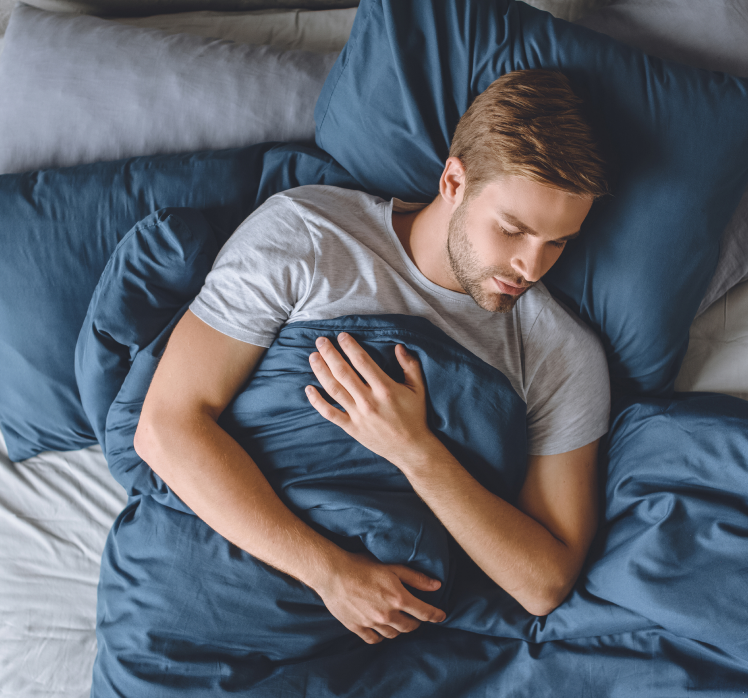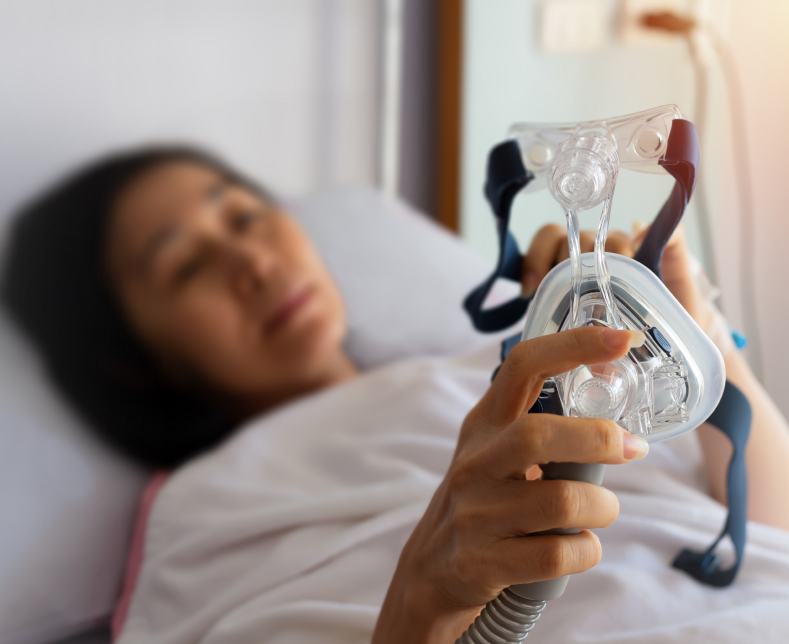Sleep Apnea Treatment in Tampa
We leverage your insurance!

Being diagnosed with sleep apnea can feel overwhelming, especially if you’ve been struggling with fatigue, restless nights, or the anxiety of not knowing why you’re not feeling your best.
Take comfort in knowing you’ve already taken the first important step toward improving your health and well-being by getting a diagnosis.
Now, we’re here to help you understand your options and guide you on the path to better sleep and a healthier future.
At Breathe Sleep Center in Tampa, we specialize in compassionate care, providing tailored sleep apnea treatment options that fit your lifestyle.
What to Do After a Sleep Apnea Diagnosis
Once you’ve been diagnosed with sleep apnea, it’s natural to have questions: What’s next? How do I get better?
The good news is that sleep apnea is highly treatable, and you don’t have to go through this journey alone.
The first step is to consult with a sleep specialist or dentist trained in sleep medicine, such as the team at Breathe Sleep Center.
We’ll work closely with you to develop a personalized treatment plan that addresses your unique needs, ensuring you get back to restful, restorative sleep.
It’s also important to share your diagnosis with your primary care physician, as untreated sleep apnea can impact your overall health, potentially leading to other issues, such as high blood pressure, heart disease, and diabetes. Partnering with your healthcare providers ensures a well-rounded approach to your care.
Why Is It Important to Treat Sleep Apnea?
Sleep apnea isn’t just about snoring or feeling tired—it’s a serious medical condition. When left untreated, it can have a significant impact on your health and quality of life
Sleep apnea deprives your body of oxygen, leading to interrupted sleep cycles and placing strain on your heart and other vital systems.
Over time, untreated sleep apnea can lead to:
High blood pressure
Heart disease
Stroke
Diabetes
Mood disorders like depression and anxiety
Increased risk of accidents due to daytime drowsiness
Treating sleep apnea can improve your energy levels and mood, and also protect your long-term health. The sooner you start treatment, the sooner you can experience the benefits of better sleep.
Sleep Apnea Treatment Options
At Breathe Sleep Center, we offer several proven options to treat sleep apnea. Each treatment is customized to fit your lifestyle, sleep patterns, and health needs.


Oral Appliance Therapy
For those with mild to moderate sleep apnea, or those who find CPAP therapy challenging, oral appliance therapy (OAT) can be an effective alternative. These custom-made devices are similar to a mouthguard or orthodontic retainer.
The oral appliance works by gently repositioning your jaw and tongue to keep your airway open while you sleep. Unlike CPAP, which requires wearing a mask, an oral appliance is compact, portable, and easy to use.
Many patients find it more comfortable and convenient, especially when traveling or for those who struggle with CPAP mask discomfort.

CPAP Therapy
Continuous positive airway pressure (CPAP) therapy is a common and highly effective treatment for moderate to severe sleep apnea.
CPAP uses a machine to deliver a constant airflow through a mask you wear over your nose, or nose and mouth, while you sleep. This steady stream of air keeps your airway open, preventing it from collapsing and ensuring you breathe properly throughout the night.
CPAP is often considered the gold standard for sleep apnea treatment because of its effectiveness in reducing apneas—pauses in breathing—and improving oxygen levels during sleep.
We will work closely with your primary care physician if CPAP is the recommended treatment for your sleep apnea.



Lifestyle Changes
In addition to CPAP or oral appliance therapy, lifestyle changes can play a key role in managing sleep apnea, especially for those with mild cases.
Simple adjustments can make a big difference. Common lifestyle changes include losing weight, avoiding alcohol or sedatives before bedtime, quitting smoking, and sleeping on your side rather than your back.
These changes help reduce the risk of airway obstruction during sleep, improving your symptoms over time.
While lifestyle modifications may not cure sleep apnea, they often complement other treatments and lead to better outcomes.
FAQs About Sleep Apnea Treatment
Which treatment is best for me—CPAP or Oral Appliance Therapy?
Your sleep apnea’s severity, your lifestyle, and your comfort level will determine which treatment is best.
Our team will work with your doctor to help you decide which option suits your needs. Both CPAP therapy and oral appliance therapy are suited for mild to severe cases, it just depends on which treatment option is right for your specific needs.
Can I Use Both CPAP and an Oral Appliance?
Yes, in some cases, patients use a combination of both treatments. For example, you might use CPAP at home and switch to an oral appliance when traveling for convenience.
Are There Any Side Effects of Using CPAP or an Oral Appliance?
CPAP users may experience nasal congestion, dry mouth, or discomfort from the mask. Oral appliance users sometimes report jaw soreness or dry mouth. However, these side effects are usually temporary and can be addressed with adjustments.
Do Lifestyle Changes Alone Treat Sleep Apnea?
Lifestyle changes can improve symptoms, especially in mild cases, but they are not typically enough on their own to fully treat moderate or severe sleep apnea.
How Soon Will I See Improvement With Treatment?
Many patients start to feel better within a few days or weeks of starting treatment. Restored energy, better mood, and improved focus are often the first noticeable benefits.

Contact Us
You deserve a restful night’s sleep and the peace of mind that comes with knowing your health is in good hands.
At Breathe Sleep Center, we’re here to support you every step of the way. If you have any questions about sleep apnea treatment or would like to schedule a consultation, please don’t hesitate to reach out.




